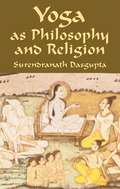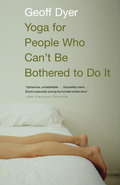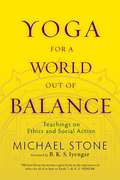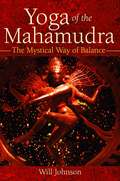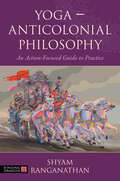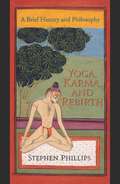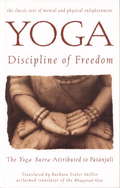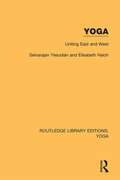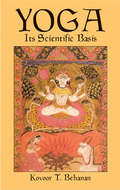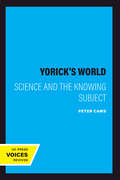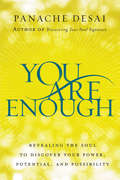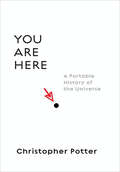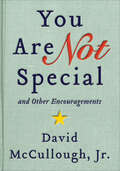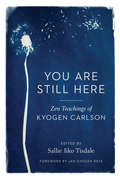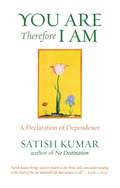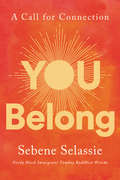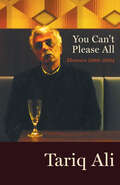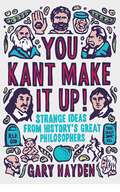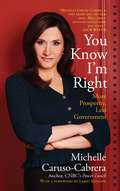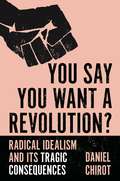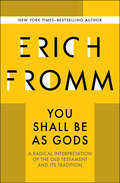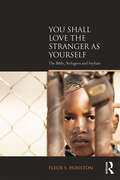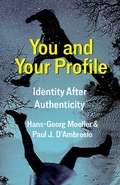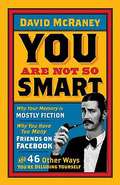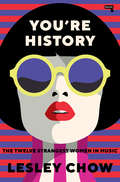- Table View
- List View
Yoga as Philosophy and Religion (Trubner's Oriental Ser.)
by Surendranath DasguptaA practical guide by an experienced teacher, this book shows how the highest form of yoga, the Rājayoga espoused by the great sage Patanjali, serves as a path to the kind of mental steadiness that ultimately yields self-realization. It explains the foundation of yoga practices — their philosophical, psychological, cosmological, ethical, and religious doctrines — and compares the essential features of Rājayoga with other yoga systems.The first of its two parts deals with yoga metaphysics, delineating the characteristics and functions of Prakrti and Purusa, the reality of the external world, and the process of evolution. The second part expounds yoga ethics and practice, with emphasis on yoga method, stages of samādhi, and related topics.Both beginners and experienced yoga practitioners will find this classic volume a useful and inspiring reference.
Yoga for People Who Can't Be Bothered to Do It
by Geoff DyerThis isn't a self-help book; it's a book about how Geoff Dyer could do with a little help. In mordantly funny and thought-provoking prose, the author of Out of Sheer Rage describes a life most of us would love to live--and how that life frustrates and aggravates him.As he travels from Amsterdam to Cambodia, Rome to Indonesia, Libya to Burning Man in the Black Rock Desert, Dyer flounders about in a sea of grievances, with fleeting moments of transcendental calm his only reward for living in a perpetual state of motion. But even as he recounts his side-splitting misadventures in each of these locales, Dyer is always able to sneak up and surprise you with insight into much more serious matters. Brilliantly riffing off our expectations of external and internal journeys, Dyer welcomes the reader as a companion, a fellow perambulator in search of something and nothing at the same time.From the Trade Paperback edition.
Yoga for a World Out of Balance: Teachings on Ethics and Social Action
by Michael StoneUsing the five principles (yama) described in the Yoga-Sutra attributed to Patanjali, Michael Stone offers a basis for rethinking ethical action and the spiritual path.
Yoga of the Mahamudra: The Mystical Way of Balance
by Will JohnsonPresents three simple yogic principles from Tilopa's Song of Mahamudra• Explains how balance is the key to achieving higher consciousness• Includes somatic koansMahamudra, literally "the great gesture," is often looked upon as the highest manifestation of consciousness known within the Tibetan Vajrayana tradition. In Yoga of the Mahamudra, Will Johnson explains how it is possible to bring forth the condition of mahamudra naturally by utilizing the mystical yoga of balance to create what he calls the embodied cross. He presents three simple yogic principles from Tilopa's Song of Mahamudra. The first principle, "do nothing with the body but relax," forms the vertical axis of the embodied cross. It is an internal process that focuses on the upright structure of the body, which opens up our relationship to the divine source. The second principle, "Let the mind cling to nothing," allows the horizontal flow of energy to our mind. This horizontal axis represents our relationship to the world: what we see and hear, and what our mind does with the objects we perceive. The establishment of these vertical and horizontal flows of energy allows us to embody the third principle, "to become like a hollow bamboo." In this way the body and mind become extraordinarily fluid, surrendering to the currents of the life forces that constantly flow through them like air through a flute. The author concludes with a number of somatic koans, exercises that allow the direct experience of balance and lead to the creation of the embodied cross.
Yoga – Anticolonial Philosophy: An Action-Focused Guide to Practice
by Shyam RanganathanProviding a decolonial, action-focused account of Yoga philosophy, this practical work from Dr. Shyam Ranganathan, pioneering scholar in the field of Indian moral philosophy, focuses on the South Asian tradition to explore what Yoga was like prior to colonization. It challenges teachers and trainees to reflect on the impact of Western colonialism on Yoga as well as understand Yoga as the original decolonial practice in a way that is accessible. Each chapter takes the reader through a journey of sources and traditions, beginning with an investigation into the colonial -Platonic and Aristotelian- approaches to pedagogy in colonized yoga spaces, through contrary, ancient philosophies of South Asia, such as Jainism, Buddhism, Sankhya, and various forms of Vedanta, to sources of Yoga, including the Upanisads, Yoga Sutra, Bhagavad Gita and Hatha Yoga Pradipika. With discussions of the precolonial philosophy of Yoga, its relationship to social justice, and modern postural yoga's relationship with colonial trauma, this is a comprehensive guide for any yoga teacher or trainee to activate and synergize their practice. Supplementary online resources bring the text to life, making this the perfect text for yoga teacher trainings.
Yoga, Karma, and Rebirth: A Brief History and Philosophy
by Stephen PhillipsFor serious yoga practitioners curious to know the ancient origins of the art, Stephen Phillips, a professional philosopher and sanskritist with a long-standing personal practice, lays out the philosophies of action, knowledge, and devotion as well as the processes of meditation, reasoning, and self-analysis that formed the basis of yoga in ancient and classical India and continue to shape it today. In discussing yoga's fundamental commitments, Phillips explores traditional teachings of hatha yoga, karma yoga, bhakti yoga, and tantra, and shows how such core concepts as self-monitoring consciousness, karma, nonharmfulness (ahimsa), reincarnation, and the powers of consciousness relate to modern practice. He outlines values implicit in bhakti yoga and the tantric yoga of beauty and art and explains the occult psychologies of koshas, skandhas, and chakras. His book incorporates original translations from the early Upanishads, the Bhagavad Gita, the Yoga Sutra (the entire text), the Hatha Yoga Pradipika, and seminal tantric writings of the tenth-century Kashmiri Shaivite, Abhinava Gupta. A glossary defining more than three hundred technical terms and an extensive bibliography offer further help to nonscholars. A remarkable exploration of yoga's conceptual legacy, Yoga, Karma, and Rebirth crystallizes ideas about self and reality that unite the many incarnations of yoga.
Yoga: Discipline of Freedom
by Barbara MillerDating from about the third century A.D., the Yoga Sutra distills the essence of the physical and spiritual discipline of yoga into fewer than two hundred brief aphorisms. It is the core text for any study of meditative practice, revered for centuries for its brilliant analysis of mental states and of the process by which inner liberation is achieved. Yet its difficulties are legendary, and until now, no translation has made it fully accessible. This new translation, hailed by Yoga Journal for its "unsurpassed readability," is by one of the leading Sanskrit scholars of our time, whose Bhagavad Gita has become a recognized classic. It includes an introduction to the philosophy and psychology underlying the Yoga Sutra, the full text with explanatory commentary, and a glossary of key terms in Sanskrit and English.From the Trade Paperback edition.
Yoga: Exercises And Meditations For All The Year Round (Routledge Library Editions: Yoga #9)
by Selvarajan Yesudian Elisabeth HaichIn this book, first published in 1956, the two authors, representatives of two different worlds and two entirely different attitudes, explore the wide domain of Eastern and Western philosophy. They put forward the theory that it is in Yoga that the two worlds meet.
Yoga: Its Scientific Basis
by Kovoor T. BehananClear explanation and evaluation of fundamental concepts of Hindu thought; historical synopsis of the development of Hindu religious philosophy; detailed descriptions of the psychology and psychoanalysis of yoga, its postures and varieties of breathing; exercises in concentration -- even methods by which yogis achieve muscular control over bodily functions.
Yorick's World: Science and the Knowing Subject
by Peter CawsPeter Caws provides a fresh and often iconoclastic treatment of some of the most vexing problems in the philosophy of science: explanation, induction, causality, evolution, discovery, artificial intelligence, and the social implications of technological rationality.Caws's work has been shaped equally by the insights of Continental philosophy and a concern with scientific practice. In these twenty-eight essays spanning more than a quarter of a century, he ranges from discussions of the work of French philosopher Gaston Bachelard, to relations between science and surrealism, to the concept of intentionality, to the limits of quantitative description. A lively mix of history, theory, speculation, and analysis, Yorick's World presents a vision of science that includes human history and social life. It will interest professional philosophers and scientists, and at the same time its directness will make it readily accessible to nontechnical readers.
You Are Enough: Revealing the Soul to Discover Your Power, Potential, and Possibility
by Panache DesaiA spiritual thought-leader and featured guest on Oprah’s SuperSoul Sunday helps us learn to quiet fear and anxiety and discover the powerful wholeness that exists within us all in this inspiring and affirmative guide.Achieving equilibrium in today’s age of anxiety can seem like a near-impossible—even frivolous—task. Panache Desai offers a refreshing, surprisingly unusual approach to meet the challenges of the modern moment and heal the fractured self it produces.For Desai, the soul—whole, unbroken, at peace, and one with the life source—isn’t a destination. It already exists within each of us, just waiting to be revealed. It is not something we have to work to develop—it is our birthright. And when we are in union with our soul, we experience a personal evolution that not only illuminates our individual cosmic purpose but helps us to engage the sense of purpose and presence necessary to remake the world itself.You Are Enough offers a straightforward, non-judgmental, and approachable process of revealing the soul, of coming into alignment and harmony with our true selves. Combining personal narrative, clear and inspiring philosophy, and prescriptive practices, it reveals that the way through is the way in—that the way through fear, self-doubt, and anxiety is accepting and embracing dissonance and emotional and psychological blockages, so that we can approach our lives and the world from a perspective that understands our fears are not who we are. Desai’s goal is simple: to guide readers through radical self-acceptance toward a life of ultimate peace and fulfillment.Beautifully designed, this enlightening volume by a fresh voice shows us that while life may have caused us to forget our power, potential, light, and love, they are always there, just waiting to be discovered.
You Are Here: A Portable History of the Universe
by Christopher Potter“A personal, brilliant, and often amusing account” of the universe and our place in it, and “an idiosyncratic, encyclopedic blitzkrieg of a book” (The Boston Globe).Here is the life of the universe, from quarks to galaxy superclusters and from slime to Homo sapiens. The universe was once a moment of perfect symmetry and is now 13.7 billion years of history. Clouds of gas were woven into whatever complexity we find in the universe today: the hierarchies of stars or the brains of mammals. Christopher Potter writes entertainingly about the history and philosophy of science, and he shows that science advances by continually removing humankind from a position of primacy in the universe, but the universe responds by placing us back there again. You Are Here is a dazzling exploration of the universe and our relationship to it, as seen through the lens of today’s most cutting-edge scientific thinking.“As close to poetry or music as science is ever likely to get. Christopher Potter’s narrative is as imaginative, ingenious, and elegantly concise as it is user-friendly.” —Sylvia Nasar, #1 New York Times–bestselling author of A Beautiful Mind“[A] clear and smoothly written look at the mind-boggling history of everything.” —Publishers Weekly (starred review)“Consistently readable . . . he makes his subject clear without dumbing it down. This is one of the best short surveys of science and its history in recent years.” —Kirkus Reviews (starred review)“A wonderful, miraculous book: the whole universe bottled for your delight.” —Stephen Fry, author of Mythos
You Are Not Special: And Other Encouragements
by David McCullough Jr.A profound expansion of David McCullough, Jr.'s popular commencement speech—a call to arms against a prevailing, narrow, conception of success viewed by millions on YouTube—You Are (Not) Special is a love letter to students and parents as well as a guide to a truly fulfilling, happy life.Children today, says David McCullough—high school English teacher, father of four, and son and namesake of the famous historian—are being encouraged to sacrifice passionate engagement with life for specious notions of success. The intense pressure to excel discourages kids from taking chances, failing, and learning empathy and self-confidence from those failures.In You Are (Not) Special, McCullough elaborates on his now-famous speech exploring how, for what purpose, and for whose sake, we're raising our kids. With wry, affectionate humor, McCullough takes on hovering parents, ineffectual schools, professional college prep, electronic distractions, club sports, and generally the manifestations, and the applications and consequences of privilege. By acknowledging that the world is indifferent to them, McCullough takes pressure off of students to be extraordinary achievers and instead exhorts them to roll up their sleeves and do something useful with their advantages.
You Are Still Here: Zen Teachings of Kyogen Carlson
by Kyogen Carlson&“There&’s so much to learn and so much to know. It&’s good to keep moving forward. And yet whatever we have is, in a very profound way, absolutely complete and always enough.&”—Kyogen Carlson Kyogen Carlson (1948–2014) was a Soto Zen priest whose writings, teachings, and commitment to interfaith dialogue supported and inspired countless Buddhist, Christian, and other spiritual practitioners. Set to the rhythm of the seasons, You Are Still Here is the first published collection of Carlson&’s dharma talks. It illuminates key elements of contemporary Zen practice, such as the experience of zazen meditation, the pitfalls and intimacies of the teacher-student relationship and of sangha life, the role of community in personal practice, and the importance of interfaith dialogue reaching across political lines. Carlson&’s teachings also underscore his commitment to lay Buddhist practice and women&’s lineages, both significant contributions to American Buddhism. The beautifully distilled talks have been carefully edited and introduced by Sallie Jiko Tisdale, a respected writer, teacher, and Dharma heir to Carlson. Her masterful presentation highlights the significance of these illuminating teachings, while preserving Carlson&’s distinct style of authenticity, humor, and conviction on the Zen path.
You Are Therefore I Am: A Declaration of Dependence
by Satish KumarYou Are, Therefore I Am is divided into parts. <P><P>The first describes his memories of conversations with his mother, his teacher, and his Guru, all of whom were deeply religious. <P><P>The second part recounts his discussions with the Indian sage Vinoba Bhave, J. Krishnamurti, Bertrand Russell, Martin Luther King, and E. F. Schumacher. <P><P>These five great activists and thinkers inspired him to engage with social, ecological, and political issues. <P><P>In the third part, Satish narrates his travels in India, which have continued to nourish his mind and reconnect him with his roots.
You Belong: A Call for Connection
by Sebene Selassie"A POWERFUL WORK OF SPIRITUALITY AND ANTI-RACISM"—Publishers Weekly"IF YOU READ ONE BOOK IN 2020, MAKE IT THIS ONE."—Tricycle From much-admired meditation expert Sebene Selassie, You Belong is a call to action, exploring our tangled relationship with belonging, connection, and each otherYou are not separate. You never were. You never will be.We are not separate from each other. But we don’t always believe it, and we certainly don’t always practice it. In fact, we often practice the opposite—disconnection and domination. From unconscious bias to “cancel culture,” denial of our inherent interconnection limits our own freedom.In You Belong, much-admired meditation expert Sebene Selassie reveals that accepting our belonging is the key to facing the many challenges currently impacting our world. Using ancient philosophy, multidisciplinary research, exquisite storytelling, and razor-sharp wit, Selassie leads us in an exploration of all the ways we separate (and thus suffer) and offers a map back to belonging. To belong is to experience joy in any moment: to feel pleasure, dance in public, accept death, forgive what seems unforgivable, and extend kindness to yourself and others. To belong is also to acknowledge injustice, reckon with history, and face our own shadows. Full of practical advice and profound revelations, You Belong makes a winning case for resisting the forces that demand separation and reclaiming the connection—and belonging—that have been ours all along.
You Can't Please All: Memoirs 1980-2024
by Tariq AliA new memoir from renowned political activist and author of Street Fighting Years: An Autobiography of the SixtiesThe revolutionary upsurge of 1968–1975 jump-hopped continents with ease but finally petered out. What happened after is the subject of You Can&’t Please All. Tariq Ali recounts a life committed to writing and cultural interventions. An eyewitness in Moscow to the fall of the Soviet Union, he was caught up in the intellectual excitement that had gripped the country. In Porto Alegre, Hugo Chávez invited him to visit Caracas, and the two men developed a striking friendship.Post-2001, as a founding member of the Stop the War Coalition, he became a fierce critic of the War on Terror, visiting many US cities with surprising regularity to engage in debate and discussion, inaugurating a new phase of political activism. Evident in his work is the integral part politics plays in his life. He is one of the most sought-after socialist and anti-imperialist public intellectuals on most continents.Underlying the narrative is a chain of anecdotes, reflections, jottings and storytelling. The book explores his work for the theatre and film, as well as his fiction, including the acclaimed Islam Quintet. There are pen portraits of friends and comrades such as Edward Said, Derek Jarman, Richard Ingrams, Benazir Bhutto, Mary-Kay Wilmers, and the intellectuals who founded and relaunched New Left Review: E. P. Thompson, Perry Anderson and Robin Blackburn.The book also contains a moving family portrait, describing how his parents met and lived during the early years of Pakistan.
You Kant Make It Up!: Strange Ideas from History's Great Philosophers
by Gary HaydenDrawing on the writings of the great philosophers, You Kant Make it Up sends the reader on thrilling, non-stop tour of their most outrageous and counter-intuitive conclusions. Augustine said that babies deserve to go to hell. Berkeley asserted that matter doesn't exist. Bentham would have argued that Dan Brown is better than Shakespeare. All these statements stem from philosophy's greatest minds. What were they thinking? Overflowing with compelling arguments for the downright strange - many of which are hugely influential today - popular philosopher Gary Hayden shows that just because something is odd, doesn't mean that someone hasn't argued for it. Spanning ethics, logic, politics, sex and religion, this unconventional introduction to philosophy will challenge your assumptions, expand your horizons, infuriate, entertain and amuse you. Gary Hayden is a journalist and popular philosopher. He has a master's degree in philosophy and has written for The Times Educational Supplement. He is the author of This Book Does Not Exist: Adventures in the Paradoxical.
You Know I'm Right
by Michelle Caruso-CabreraStraight-talking CNBC reporter Michelle Caruso-Cabrera demands a modern solution to our nation's social and economic woes--a return to our political roots: fiscal conservatism, limited government, and personal accountability.Hypocrites and radicals on both sides of the political spectrum have left fiscally conservative, socially liberal Americans like CNBC's Michelle Caruso-Cabrera people without a party. If you tell your neighbors you're a card-carrying Republican, they'll assume you're opposed to abortion, hostile to gay marriage, and don't care about the environment or the poor. Democrats are portrayed as union-loving, tree-hugging activists, more concerned with making government big rather than effective. The reality is that both parties have been hijacked by the wrong issues and have abandoned the loyal Americans who believe that government should stay out of our private lives and out of our pocketbooks.Both parties are to blame for the exorbitant spending and excessive social interference over the last ten years that have left our country in a financial disaster. The core principles of Reaganomics rejuvenated an unstable economy and the Clinton-era policy successes took power away from the federal government and put money in our pockets. We must return to the fundamentals of American politics: small, not big, government. Less spending, not more. The first step is to more narrowly define the parties' platforms away from needlessly divisive social issues and refocus the political discussion on that really matters: economic policies that create jobs.In the smart, tell-it-like-it-is style that has made her popular with Democrats and Republicans like, Caruso-Cabrera outlines forward-thinking free-market solutions for health care, education, and immigration. These ideas will stop our growing deficit, boost our competitive capital, and strengthen our dollar, because an economy that is flexible and free of government interference can grow faster and get the country out of its current malaise. It's not too late to fix our nation, restore our credibility, and rebuild our political system with the tenets on which it was founded: fiscal conservatism and social liberty. Our future is counting on it.
You Say You Want a Revolution?: Radical Idealism and Its Tragic Consequences
by Daniel ChirotWhy most modern revolutions have ended in bloodshed and failure—and what lessons they hold for today's world of growing extremismWhy have so many of the iconic revolutions of modern times ended in bloody tragedies? And what lessons can be drawn from these failures today, in a world where political extremism is on the rise and rational reform based on moderation and compromise often seems impossible to achieve? In You Say You Want a Revolution?, Daniel Chirot examines a wide range of right- and left-wing revolutions around the world—from the late eighteenth century to today—to provide important new answers to these critical questions.From the French Revolution of the eighteenth century to the Mexican, Russian, German, Chinese, anticolonial, and Iranian revolutions of the twentieth, Chirot finds that moderate solutions to serious social, economic, and political problems were overwhelmed by radical ideologies that promised simpler, drastic remedies. But not all revolutions had this outcome. The American Revolution didn't, although its failure to resolve the problem of slavery eventually led to the Civil War, and the collapse of communism in Eastern Europe was relatively peaceful, except in Yugoslavia. From Japan, North Korea, Vietnam, and Cambodia to Algeria, Angola, Haiti, and Romania, You Say You Want a Revolution? explains why violent radicalism, corruption, and the betrayal of ideals won in so many crucial cases, why it didn't in some others—and what the long-term prospects for major social change are if liberals can't deliver needed reforms.A powerful account of the unintended consequences of revolutionary change, You Say You Want a Revolution? is filled with critically important lessons for today's liberal democracies struggling with new forms of extremism.
You Shall Be as Gods: A Radical Interpretation of the Old Testament and Its Tradition
by Erich FrommFrom the social philosopher and New York Times–bestselling author of The Sane Society: An analysis of the Old Testament as a revolutionary humanist work. The Old Testament is one of the most carefully studied books in the world&’s history. It is also one of the most misunderstood. This founding text of the world&’s three largest religions is also, Erich Fromm argues, an impressive radical humanist text. He sees the stories of mankind&’s transition from divided clans to united brotherhood as a tribute to the human power to overcome. Filled with hopeful symbolism, You Shall Be As Gods shows how the Old Testament and its tradition is an inspiring ode to human potential. This ebook features an illustrated biography of Erich Fromm including rare images and never-before-seen documents from the author&’s estate.
You Shall Love the Stranger as Yourself: The Bible, Refugees and Asylum (Biblical Challenges in the Contemporary World)
by Fleur S HoustonYou Shall Love the Stranger as Yourself addresses the complex political, legal, and humanitarian challenges raised by asylum-seekers and refugees from a Biblical perspective. The book explores the themes of humanity and justice through exegesis of relevant passages in the Old and New Testaments, skillfully woven into accounts of contemporary refugee situations. Applying Biblical analysis to one of the most pressing humanitarian concerns of modern times, Houston creates a timely work that will be of interest to students and scholars of theology, religion, and human rights.
You and Your Profile: Identity After Authenticity
by Hans-Georg Moeller Paul J. D'AmbrosioMore and more, we present ourselves and encounter others through profiles. A profile shows us not as we are seen directly but how we are perceived by a broader public. As we observe how others observe us, we calibrate our self-presentation accordingly. Profile-based identity is evident everywhere from pop culture to politics, marketing to morality. But all too often critics simply denounce this alleged superficiality in defense of some supposedly pure ideal of authentic or sincere expression.This book argues that the profile marks an epochal shift in our concept of identity and demonstrates why that matters. You and Your Profile blends social theory, philosophy, and cultural critique to unfold an exploration of the way we have come to experience the world. Instead of polemicizing against the profile, Hans-Georg Moeller and Paul J. D’Ambrosio outline how it works, how we readily apply it in our daily lives, and how it shapes our values—personally, economically, and ethically. They develop a practical vocabulary of life in the digital age. Informed by the Daoist tradition, they suggest strategies for handling the pressure of social media by distancing oneself from one’s public face. A deft and wide-ranging consideration of our era’s identity crisis, this book provides vital clues on how to stay sane in a time of proliferating profiles.
You are Not So Smart: Why Your Memory is Mostly Fiction, Why You Have Too Many Friends on Facebook and 46 Other Ways You're Deluding Yourself
by David McraneyHow many of your Facebook friends do you think you know? Would you help a stranger in need? Do you know why you're so in love with your new smartphone? The truth is: you're probably wrong. You are not so smart. In this international bestseller, award-winning journalist David McRaney examines the assorted ways we mislead ourselves every single day. A psychology course with all the boring bits taken out, prepare for a whirlwind tour of the latest research in the subject, fused with a healthy dose of humour and wit. You'll discover just how irrational you really are, which delusions keep you sane, how to boost your productivity, and why you've never kept a New Year's resolution.
You're History: The Twelve Strangest Women in Music
by Lesley ChowRaucous, sensual and sublime: how twelve pioneering female artists rewrote the rules of pop.From Kate Bush to Nicki Minaj, from Janet Jackson to TLC and Taylor Swift, pop's greatest female pioneers are simply strange: smashing notions of taste and decorum, and replacing them with new ideals of pleasure. Instead of rehashing biographies, Lesley Chow dives deep into the music of these groundbreaking performers, identifying the ecstatic moments in their songs and finding out what makes them unique. You're History is a love letter to pop's most singular achievements, celebrating the innovations of women who are still critically underrated. It's a ride that includes tributes to Chaka Khan, Rihanna, Neneh Cherry, Sade, Shakespears Sister, Azealia Banks, and many more...
